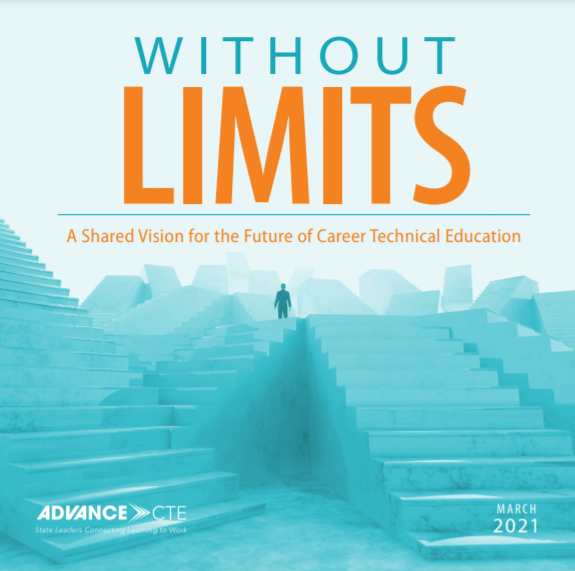 Today, Advance CTE released a repository of partner initiatives related to Without Limits: A Shared Vision for the Future of Career Technical Education (CTE Without Limits). The intent of this resource is to elevate existing national investments in the CTE, education and workforce fields related to the principles of this shared vision and to highlight current gaps to determine where future investments need to be made to accomplish the vision.
Today, Advance CTE released a repository of partner initiatives related to Without Limits: A Shared Vision for the Future of Career Technical Education (CTE Without Limits). The intent of this resource is to elevate existing national investments in the CTE, education and workforce fields related to the principles of this shared vision and to highlight current gaps to determine where future investments need to be made to accomplish the vision.
Repository initiatives were shared with Advance CTE by national partners that have signed on to CTE Without Limits. The initiatives submitted by partners serve as concrete examples from the field to help conceptualize how the principles and action areas from CTE Without Limits can be realized with shared commitment and shared ownership among leaders and practitioners at all levels.
CTE leaders will be able to access the learning and resources from the examples in this repository as a starting point for building on existing work related to the vision and laying new building blocks for transformational systems change that allows each learner to achieve success in the career of their choice without limits.
The repository currently has over 50 initiatives submitted by over 20 vision partners and will serve as a living resource that will be periodically updated. Below are a few of the examples organized by principle:
Principle 1: Each learner engages in a cohesive, flexible, and responsive career preparation ecosystem
- Southern Regional Education Board (SREB): Known as Making Schools Work and spanning grades 3-14, SREB’s continuous improvement process is grounded in the belief that increased achievement starts with motivating students to make the effort to succeed. With designs for elementary grades, middle grades, high schools and technology centers, Makings Schools Work shows school teams how to create improvement plans that address five focus areas: quality instruction; aligned curriculum; career exploration and pathways; student supports; and cultures of continuous improvement.
Principle 2: Each learner feels welcome in, is supported by, and has the means to succeed in the career preparation ecosystem
- Achieving the Dream: Eight community colleges were selected in June, 2020, to participate in College Success for Single Mothers, a project led by Word Education’s National College Transition Network in partnership with Achieving the Dream and PERG Learning, with funding from ECMC Foundation. The goal of the project is to identify the needs of single mother students on campus and develop an action plan to address their needs and expand key practices and services to enhance their success in college and careers.
Principle 3: Each learner skillfully navigates their own career journey
- Education Strategy Group (ESG): Making the Connection: Aligning Advising to Improve Postsecondary Access and Success makes the case for prioritizing alignment of advising across K-12 and higher education, offers a vision for achieving that alignment, and lays out concrete action steps and resources for the many stakeholders who have a role to play. This new resource was developed with input from an Expert Workgroup, comprised of national, state and local leaders, and will serve as the foundation for ESG’s efforts to ensure that high-quality, aligned advising is an expectation for every student, not enrichment for some. The microsite was developed with support from the Bill & Melinda Gates Foundation as part of the Level Up.
Principle 4: Each learner’s skills are counted, valued, and portable
- U.S. Chamber of Commerce Foundation: A new open-data tool, the Job Data Exchange (JDX) is the vehicle employers need to move in a scalable, sustainable way towards competency-based hiring. The JDX, and the data standard it employs, will help employers and their HR partners break down a job description into specific skill and hiring requirements. Open-source, non-proprietary, and free to use, the JDX collects that hiring data in a structured, machine-readable way and then makes that data available to the education and workforce partners that are helping students and job seekers prepare for the workforce.
Principle 5: Each learner can access CTE without borders
- Western Interstate Commission for Higher Education (WICHE): Interstate Passport® is the only nationwide network of institutionally accredited, nonprofit, public and private two- and four-year institutions dedicated to the block transfer of lower-division general education attainment based on multi-state faculty-developed learning outcomes and proficiency criteria instead of on specific courses and credits. Students of member institutions experience a seamless, efficient and economical transfer process.
To access the repository and more implementation resources related to CTE Without Limits, visit: careertech.org/without-limits.
Christina Koch, Policy Associate
